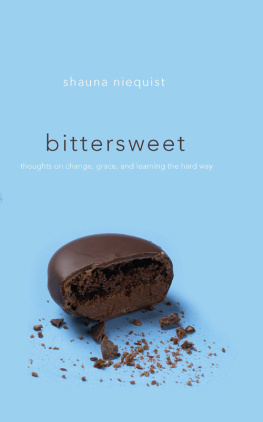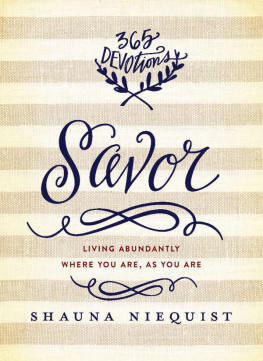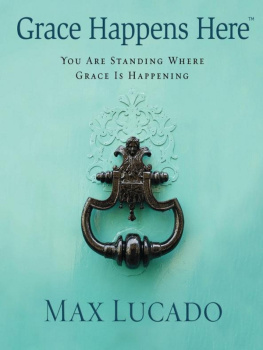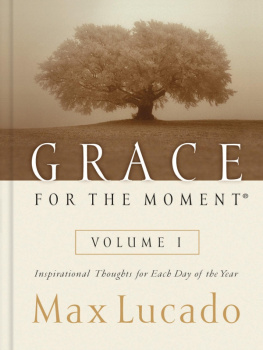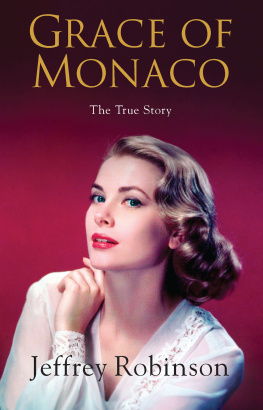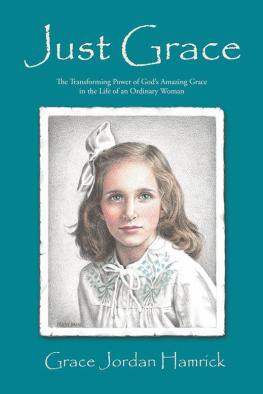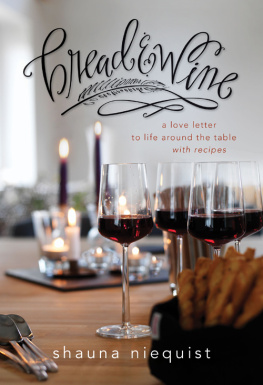For Aaron
Most of what Ive learned about love and about art, Ive learned from you.
Youre the love story of my life.
Prologue
bittersweet
The idea of bittersweet is changing the way I live, unraveling and re-weaving the way I understand life. Bittersweet is the idea that in all things there is both something broken and something beautiful, that there is a sliver of lightness on even the darkest of nights, a shadow of hope in every heartbreak, and that rejoicing is no less rich when it contains a splinter of sadness.
Bittersweet is the practice of believing that we really do need both the bitter and the sweet, and that a life of nothing but sweetness rots both your teeth and your soul. Bitter is what makes us strong, what forces us to push through, what helps us earn the lines on our faces and the calluses on our hands. Sweet is nice enough, but bittersweet is beautiful, nuanced, full of depth and complexity. Bittersweet is courageous, gutsy, earthy.
Nearly ten years ago, my friend Doug told me that the central image of the Christian faith is death and rebirth, that the core of it all, over and over again, is death and rebirth. Im sure Id heard that before, but when he told me, for whatever reason, I really thought about it for the first time. And at the time, I didnt agree.
What I didnt understand until recently is that he wasnt speaking to me as a theologian or a pastor or an expert, but rather as a person whose heart had been broken and who had been brought back to life by the story God tells in all our lives. When you havent yet had your heart really broken, the gospel isnt about death and rebirth. Its about life and more life. Its about hope and possibility and a brighter future. And it is, certainly, about those things.
But when youve faced some kind of deaththe loss of someone you loved dearly, the failure of a dream, the fracture of a relationshipthats when you start understanding that central metaphor. When your life is easy, a lot of the really crucial parts of Christian doctrine and life are nice theories, but you dont really need them. When, however, death of any kind is staring you in the face, all of a sudden rebirth and new life are very, very important to you.
Now, ten years later, I know Doug was right. Ive thought about his words a thousand times in the last few years, a season in my own life that has felt in some moments like death at every turn. Ive begun to train my eyes for rebirth, like looking for buds on branches after an endlessly long winter. I know that death is real, and I trust that rebirth is real, too.
Christians, generally, arent great at lament and mourning. Jews are really better at lament, maybe because theyve had more practice. My favorite part of a Jewish wedding is the breaking of the glass. Like most Jewish traditions, there are a whole bunch of interpretations: some say that all the shards of broken glass suggest loads of future children and future happiness. Some say that the breaking of the glass references the irreversible nature of marriage: in the same way that the glass can never be put back together after its been broken, two people can never be separated once theyve been connected by marriage. But my favorite interpretation is the one where the wine in the glass is a symbol for all of life, and when the bride and groom drink it, they accept both the bitter and the sweet aspects of life. They accept that sometimes theyll celebrate and sometimes theyll mourn, in the same way that sometimes theyll drink wine and sometimes glasses will shatter.
This collection is an ode to all things bittersweet, to life at the edges, a love letter to what change can do in us. This is what Ive come to believe about change: its good, in the way that childbirth is good, and heartbreak is good, and failure is good. By that I mean that its incredibly painful, exponentially more so if you fight it, and also that it has the potential to open you up, to open life up, to deliver you right into the palm of Gods hand, which is where you wanted to be all along, except that you were too busy pushing and pulling your life into exactly what you thought it should be.
So this is the work Im doing now, and the work I invite you into: when life is sweet, say thank you and celebrate. And when life is bitter, say thank you and grow.
I learned about waves when I was little, swimming in Lake Michigan in navy blue water under a clear sky, and the most important thing I learned was this: if you try to stand and face the wave, it will smash you to bits, but if you trust the water and let it carry you, theres nothing sweeter. And a couple decades later, thats what Im learning to be true about life, too. If you dig in and fight the change youre facing, it will indeed smash you to bits. It will hold you under, drag you across the rough sand, scare and confuse you.
This last season in my life has been characterized, more than anything else, by change. Hard, swirling, one-after-another changes, so many that I cant quite regain my footing before the next one comes, very much like being tumbled by waves. It began three years ago, in January in Grand Rapids, Michigan. I got pregnant, lost a job I loved, had a baby, wrote a book. A year after I lost my job, my husband, Aaron, left his job in a really painful way, and then for the next year and a half we traveled together and separately almost every week, doing all the freelance work we could find, looking for a new home and trying to pay the bills. Leaving our jobs at the church meant leaving the church community, the heart of our world in Grand Rapids, and that loss left a hole in our lives that was as tender and palpable as a bruise.
The day after our son Henrys first birthday, my brother Todd left on a two-year sailing trip around the world, taking my husbands best friend Joe with him. My best friend, Annette, left Grand Rapids and moved back to California. I got pregnant again, our kitchen and basement flooded, and on the Fourth of July I lost the baby. My first thought, there in the doctors office, was, Everything in my life is dying. I cant keep anything alive.
At some point in all that, we put our house up for sale, which meant lots and lots of showings but no offers. After several months, my husband and our son and I left our house still for sale and moved home to Chicago, to a little house on the same street I lived on as a child, exhausted and battered, out of breath and shaken up.
It may appear to an outside observer that these have been the best years of our lives. We became parents to a healthy child; we met interesting people and heard their stories and were welcomed into their homes and churches. I wrote a book, and Aaron recorded an album, and we got to be, really and truly, working artists. Every time I read over that list, I know that it should have been wonderful. But should have been is worth absolutely nothing. For most of that season, I was clenching my teeth, waiting for impact, longing for it to be over.
I know that to another person my difficult season would have been a walk in the park, and that all over the world, people suffer in unimaginable ways and manage far worse than my own little list.
I was miserable because I lost touch with the heart of the story, the part where life always comes from death. I love the life part, and I always try to skip over that pesky death part. You cant do that, as much as Ive tried.
I believe that God is making all things new. I believe that Christ overcame death and that pattern is apparent all through life and history: life from death, water from a stone, redemption from failure, connection from alienation. I believe that suffering is part of the narrative, and that nothing really good gets built when everythings easy. I believe that loss and emptiness and confusion often give way to new fullness and wisdom.

